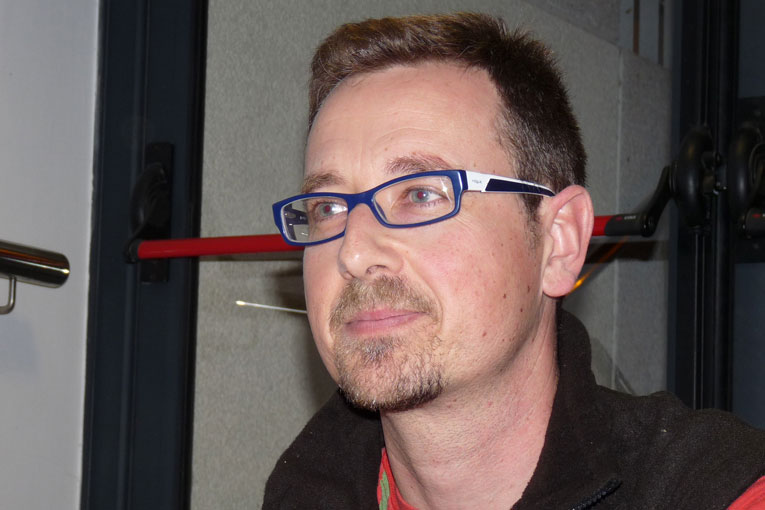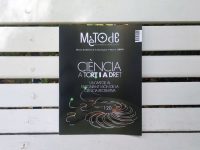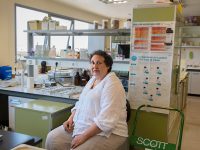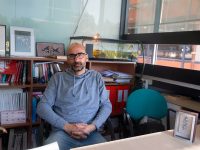
 © Marina Sanjuan |
||
|
Manel Porcar, biotechnician at the Cavanilles Institute of the University of Valencia and expert in transgenic food, was a Greenpeace member some years ago. Nowadays he rejects the radical environmentalism of this organisation and their diffusion campaigns. From a scientific point of view he also wants to get involved in communication, since he believes that is the only way to finish with this misconception of genetically modified products. |
||
|
If the buyer reads «Genetically modified food» in a label, immediately puts it back on the shelf, scared of the possible consequences of eating it. «Transgenic only means genetically modified. These products are added some proteins using molecular biology techniques», says Manel Porcar. For instance, in agricultural products, this modification makes the product more tolerant to herbicides and insects. Genetic modification, explains, is very common. «We ourselves are the product of gene transmission generation after generation». But if we add the adjective artificial, people sound the alarm. «People don’t like the mix of life and artificial modification, because the result is artificial, mutant organisms». When humans play to create organisms they pay for it —Can anyone forget about Frankenstein? «Everything is based on instinctive associations— transgenic= artificial= negative». This association is exploited in anti-GMO product campaigns. «Their demonization has been a success and one ends up thinking there must be something wrong with them». Is our health at risk? The more widely spread fear is the risks GM foods might entail for humans, which has made transgenic food the most studied agricultural technology in history and also the one that has passed more tests. Manel Porcar works for the Spanish National Biosecurity Commission, where genetically modified products are tested before they are put in the market. «Up until now, all studies have concluded that there is no toxicity in them. What’s more, now we know exactly what a transgenic product has, while we can’t be sure of what we are eating with traditional products, since they are treated with highly toxic pesticides». But the buyer feels unsafe because they also talk about the existence of some genes strong enough against antibiotics in genetically modified products. «That’s another myth. Demagogy is very common while talking about GMOs» points out the biotechnician and adds «what has been proven is that a poorly cleaned salad has a million bacteria that are strong against antibiotics. But they don’t talk about that». Environmental alarm Once toxicity is disregarded, another common form of criticism is referring to the alleged negative influence of GMOs on the non-target fauna. «Some studies show that is true, but I find this argument is only valid in part». To be fair, he says, we have to take into account what the alternatives would mean —traditional agriculture— since GMOs reduce the use of pesticides, which can kill the fauna around them. Likewise, we can’t blame GMO’s for the reduction of biodiversity, another «half-truth», according to the biotechnician. In his article published in Mètode Transgenic opinions, Manel Porcar claimed that what the popularisation of certain varieties does, both transgenic and non-transgenic, is making other kinds disappear. In the 17th century, a Dutch farmer chose the orange carrot variety we know today because this colour was a symbol for the Dutch royal family. It was a great success and the carrot variety was widely spread. «Behind this case there was an aesthetic and political issue. Without growing GMOs, biodiversity has been reduced. Genetic atrocities are very normal». But society is not yet convinced. The transgenic business Ever since it appeared in 1996, GMOs have become the number one spreading technology. America is the continent that grows more GMOs, while in Europe, Spain stands out as the highest producing country of genetically modified corn. There are 98.000 hectares growing MON810 corn in Spain and afterwards sold by Monsanto, a multinational company. «All GMOs are in the hands of multinational companies, and it is true that monopolies can be a problem, but it all depends on how this technology is used». And he shows and example that makes him be optimistic —Golden Rice, a kind of rice that has been added vitamin A. This GMO was developed to put an end to the eye problems millions of Asian children suffer from due to the lack of vitamin A in this cereal, which is the basis of their diet. However, this product— the result of a research funded by a multinational company— has not yet been approved for its commercialisation. Their power is not absolute, since society mistrusts them. A communication battle «From the point of view of communication it has been a catastrophe. It is already a lost battle». The biotechnician claims that not even the nuclear energy case can be compared to the GMOs situation. « “Let’s try to explain very clearly what we are working on lest we fall in the same situation researchers on GM food have fallen” is generally heard among biologists» The press and their newsability criteria are not helpful either. «Only studies that show spectacular results, especially negative results, have some kind of repercussion». The most recent case is a study that linked tumour development with the eating of GM foods. It was a front-page story in many Spanish media, but when it was revealed they were false results the press did not inform about it. «It may look like I am for GMOs, when what I am is firmly not against. As a scientist, I simply rebel when what it is said is untrue». His science writer facet has a lot to do with this statement. Manel Porcar emphasises the importance of thinking for ourselves and gives us objective data. That is why he stops in front of a slogan and reads out loud with anger: « THE GREENS: CLEAR INFORMATION TO BE ABLE TO SAY “NO”. What we have to do is let people decide whether they want to say “yes” or “no”.» Information is the tool that enables us to decide. Marina Sanjuan. Student of Journalism at the University of Valencia. |
«Their demonization has been a success and one ends up thinking there must be something wrong with them»
«A poorly cleaned salad has a million bacteria that are strong against antibiotics, but they don’t talk about that»
«Without growing GMOs, biodiversity has been reduced. Genetic atrocities are very normal»
«All GMOs are in the hands of multinational companies, and it is true that monopolies can be a problem, but it all depends on how this technology is used»
«We have to let people decide whether they want to say “yes” or “no”. Information is the tool that enables us to decide» |
|





